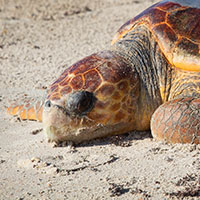 Leatherback turtles making early appearance on our quiet beaches
Leatherback turtles making early appearance on our quiet beaches
STORY BY SUE COCKING
Amid all the coronavirus news comes this positive bellwether from the sea: Leatherback sea turtles – the largest of the three species seen on Indian River County beaches – are nesting here earlier than in previous years.
The endangered reptile, whose tracks resemble bulldozer treads in the sand, laid its first nest of the 2020 season March 10 in Indian River Shores. Five more nests were deposited by mid-March – four in the southern part of the county and one more in the Shores. Then another six were counted through April 3, mostly in the south, for a total of 12 so far.
According to Indian River County's Coastal Engineering Division, the earliest leatherback nest previously laid here was on March 11, 2016.
“It is extremely difficult to infer if early nesting equates to a bumper nesting season,” according to the county. “However, the outlook is looking good. We are extremely hopeful that we will observe an increase of leatherback nesting this year.”
Leatherbacks – the largest marine turtle in world, growing up to 1,100 pounds – tend to be the earliest nesters on our beaches, followed by loggerheads and then greens. Both of the latter two species lay many more nests than the leatherbacks; in 2019, 37 leatherback nests were tallied – lower than the historic average of 51. By contrast, loggerheads accounted for more than 6,100 and greens for more than 2,300.
County spokesman Brian Sullivan, when asked if COVID-19-prompted beach closures might be having a positive effect on turtle nesting, said “we have not observed any obstructions or disturbances to nesting.”
Sullivan added that so far, no citations have been issued this year for “dark beach” lighting violations, which are aimed at protecting nesting turtles and their hatchlings from becoming disoriented by manmade lighting on the shore.




